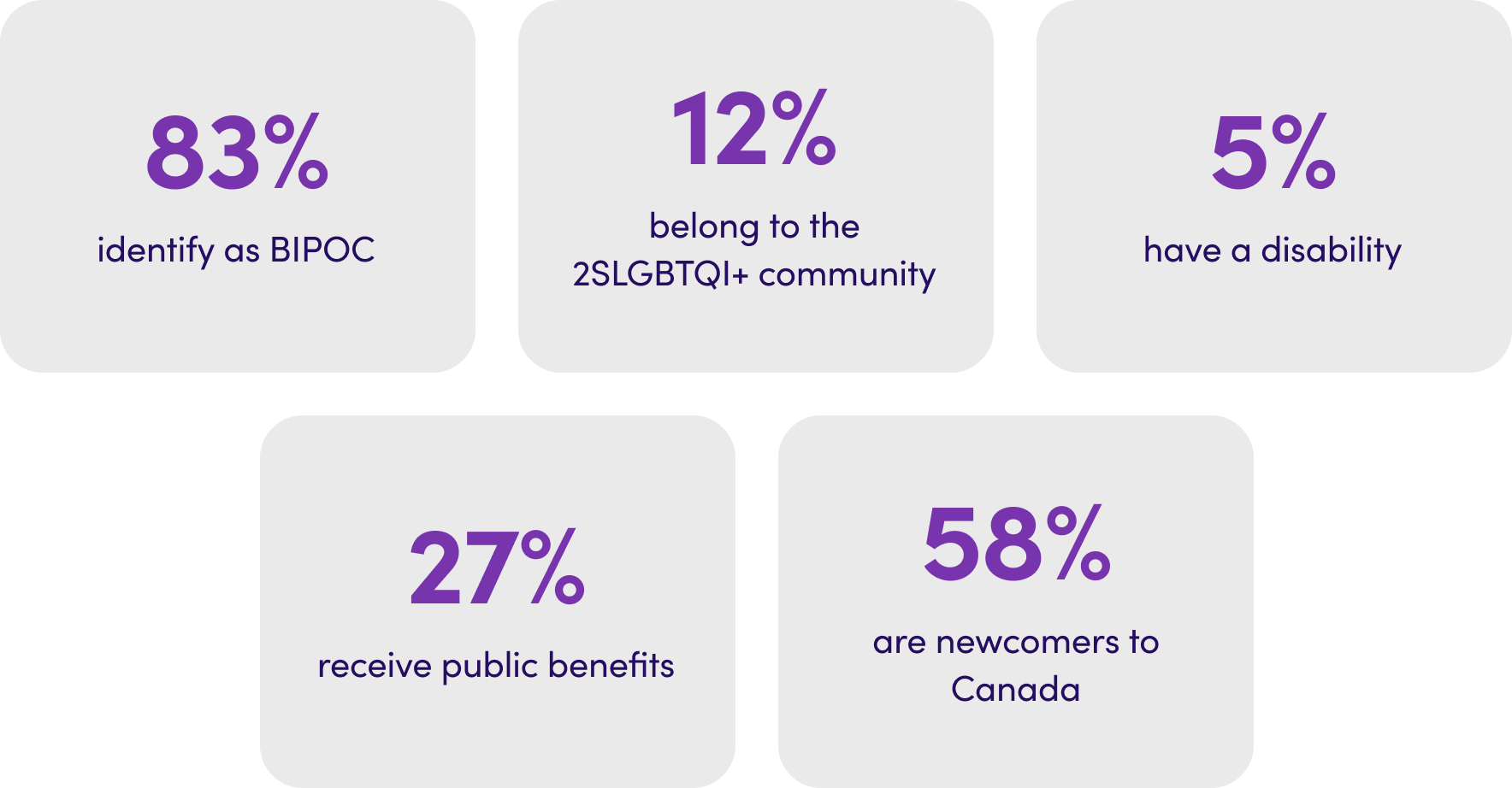
Skills-Based Training
Follow Sarah’s reskilling journey and discover the practical benefits of Skills-Based Training for all players in the Rapid Skilling System. Then explore real-world examples and best practices around Skills-Based Training.

Step 3 of Sarah’s Journey
Skilling up
“What are my options if I can’t afford to go back to university?”
After receiving her assessment results, Sarah knows which certifications she needs to get to become a Junior Data Analyst. But the courses are expensive, and if she completes them at home on her own, she won’t have anyone to ask for help.
Sarah discovers a free of charge government-funded skills-based training program for new Canadians from diverse backgrounds. She takes the 12-week program, which is offered online with accommodations for her single parenting responsibilities.
Sarah earns the certifications she needs through the program, but she also gets workplace skills training, such as resume advice, and mock interviews. In addition, she forges relationships with her instructors and classmates and builds her network.

What is Skills-Based Training?
Skills-based training programs help individuals master tasks using hands-on practice and real-world application. Training can be designed for learners with no experience in a particular industry, or for those who already work in a field and want to improve their skillset.
The benefits of Skills-Based Training:
For employees:
By acquiring in-demand skills, employees become more attractive to current and potential employers, enhancing their career advancement opportunities.
For employers:
Hiring individuals who already possess the needed skills or providing targeted skills training can be more cost-effective for employers than comprehensive general training.
For educators:
Skills-based training allows educational institutions to tailor their curricula to meet the current demands of the labor market, increasing the employability of their graduates.
For employment counselors:
By advocating for and guiding clients towards skills-based training, employment counselors can help them achieve better employment outcomes, improving client satisfaction and success rates.

Putting Skills-Based Training in action
WHO: Training providers
WHO: Find industry partners who can contribute investment, courses and industry connections to benefit learners

Innovation in Action
Canadian Tech Talent Accelerator (CTTA)
A 14-week online bootcamp aimed at training Junior Digital Analysts (JDAs) through hands-on learning, industry mentoring, and professional development. The JDA program is targeted at unemployed and underemployed youth between the ages of 18 and 29 who have some prior tech experience and are from communities underrepresented in the digital economy.
What they’re doing
The CTTA is a strong example of how Skills-Based Training can be executed in the Rapid Skilling System for a number of different reasons:
Innovative private-public partnership
A number of stakeholders in both government and the corporate world worked together to make this free-of-charge training program possible:
- Microsoft provided investment, courses and industry connections
- NPower Canada delivered the training
- Blueprint acted as a third-party evaluator of the program
- DIGITAL helped with funding, testing and scaling innovation
Scalability
Although the accelerator began by training Junior Data Analysts, it has now added other streams, such as Cybersecurity. As it expands, the program has found new training providers and platforms to scale up, helping them to act quickly if they see an emerging need in the market.
Flexibility
Graduate respondents spoke about the value of the program’s online format for providing flexibility and accessibility, with individualized accommodations available for diverse personal and professional commitments.
Fostering community
Both graduates and staff spoke about the importance of team building and community that was created through the program, where there was a strong willingness for peers to support and mentor one another, enabling participants to benefit from the diverse expertise and experiences of their peers.
The program’s demographics by the numbers:

Impressive results
The Canadian Tech Talent Accelerator has enabled:
- 3,300+ diverse job seekers to enroll in NPower Canada’s workforce development program nationwide
- 80% of program graduates to secure meaningful and sustainable employment within six months
- significantly higher salaries than baseline for graduates in their first jobs after completing the program
- testimonials from employers who were pleased with the consistent competency level of the graduates and are happy that the program is a stable source of talent for them
Continue with the Rapid Skilling System Playbook
You just explored Element 03. Skills-Based Training, where Sarah filled the skill gaps identified by her assessment results. Next up: Element 04. Credentials, where Sarah acquires the qualifications she needs to make her career transition possible.

element 04
Credentials
As the number of credentials available to learners surges, consistent quality standards and metrics across the credentialing system is the key to ensuring their usefulness for learners and employers alike.